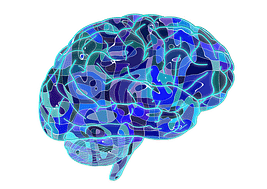What is the problem?
From Eminem and Marilyn Manson, to even the Beatles, music has been blamed for many people’s decisions to commit crime. Parents often claim their kids are being influenced by music to do drugs, be violent, skip school, and many other things that are causing them to act out.
But is the music really what should be blamed for these actions? If so, what type of music has the greatest influence? Some say rap music’s history of violent lyrics are the main source of the cases, with Eminem’s style of “Cartoon Rap,” being one of the most hated on.
But with such a large variety of cases, it is very unlikely that music was the source of people’s actions alone, and that most times the ideas are bias and/or exaggerated to use music as a scapegoat.
The science behind music and the brain

(courtesy to publicdomainpictures.net)
According to a CNN article, Dr. Charles Limb, who is an associate professor of otolaryngology, claims that, “There’s enough evidence to say that musical experience, musical exposure, musical training, all of those things change your brain, It allows you to think in a way that you used to not think, and it also trains a lot of other cognitive facilities that have nothing to do with music.”

(Courtesy to Geralt)
With music and your brain, many extraordinary things happen. Not only does the auditory cortex (the part that interprets sound), become activated while listening to music, but so do the areas’ of the brain that involve movement, motor coordination, attention, and emotion.
While listening to music, your brain releases dopamine, which is a chemical in the brain that makes you feel happy and rewarded. Because dopamine is a reward chemical, it also produced while doing any other kind of addictive action, such as drugs, eating, and sex.
According to another CNN article, a study at Stanford University of Medicine showed that when healthy people listened to the same music, their brains reacted in the same way, with those who had language or other mental health issues to react differently to the same song, even with music that had no words at all.
Another study by Valorie Salimpoor at McGill University showed that the reason we have different tastes in music is because of how we grew up. what happens is our brain creates what Salimpoor calls, “musical memory templates,” which are like files in a file cabinet that keep a record of what music we were subjected to the most.
When we hear a type of music that is similar to what we usually hear our brains release dopamine as opposed to listening to a type that we usually don’t or that we are unfamiliar with that has no common characteristics with what we usually do listen to.
Since music affects our moods in different ways we must now look at those who interpret music differently.
Controversy
It is impossible to truly say how many times music was blamed for crimes, but there are a few popular ones that have gotten a large amount of speculation. One of which being Charles Manson and the Manson family murders. According to Stephanie Almazan of the “Line Up“, Charles Manson apparently claims he heard The Beatles talking to him and relating to his darker perspective of the world in the album, “The White Album”.
The killer cult leader was claiming The Beatles were reaching out to him and pushing him to start armageddon with a race war between the black and the white communities. With such an outrageous claim people ignored it as they did not believe that the “Groovy Four” were capable to be working with Manson and the gruesome murders of Sharon tate and the LaBianca’s.
According to Dr. Scott Bonn, professor of sociology and criminology at Drew University, Manson got his “Mission Killers” to follow him and his vision of the armageddon he called Helter Skelter after The Beatles’ song off of The White Album.
Another time an artist was blamed for another’s actions in Arizona when Michael Miller stabbed and killed his wife and two kids while seriously injuring his third child. According to Fox News Miller claimed he was rapping Eminem’s lyrics while killing his family, saying that he envisioned his wife as a demon and that he stabbed his son Brian eleven times because he “Loved him the most”.
The lyrics that he claimed he was rapping were, “Here comes Satan, I’m the Antichrist, I’m going to kill you”, but when searched these lyrics do not appear anywhere whatsoever, providing even more evidence of a scapegoat.
Does rap music truly have the most affect us?

(Courtesy of Pixabay)
The amount of accusations is incredible with an even larger amount of people supporting them. But is music a real threat to society, let alone children? According to NPR, ” A recent study at the Prevention Research Center of the Pacific Institute for Research and Evaluation in Berkeley, Calif., suggests that, ‘ young people who listen to rap and hip-hop are more likely to abuse alcohol and commit violent acts'”.
But is this necessarily true? According to Eliana Tropeano’s research paper, (of Western Connecticut University), music can have negative impact on the mind:
“Barongan and Nagayama Hall (1995) examined the effects of cognitive distortions men had towards women. The men in this study viewed women in a sexually aggressive way. The men’s behavior was observed in a laboratory setting. Twenty-seven men listened to misogynous rap music and 27 men listened to neutral rap music. Participants then viewed neutral, sexually-violent, and assaultive film vignettes and chose the vignette that they found appealing. The results showed that ‘participants who viewed the sexual-violent stimuli indeed felt sexually violent towards women, even having thoughts of raping and abusing women.’”
with these results in mind, it is clear that music does have an impact on how people perceive certain things when listening to specific types of music.
Now step out of the box for a moment, what is music in general? Usually you may say that it is a story of some sort, that it’s people describing their life or life events. Like any good story there is a beginning, and the beginning of rap’s revolution was in the early 90’s when gangs were beginning to rise and create violence in the urban areas of America. What comes with that are stories of those who are affected by these events, with or without participation of being in a gang. With some of these people becoming rap artists of all kinds, it can give the genre a bad reputation.
How much exactly does music influence people overall?
Well, this is very hard to say. We all know now that music does affect our mood while we listen to it, but it is not true that a certain type of music will make a average person violent or rebellious. Yet there are those who are more susceptible to others.
According to Brian A. Primack, EdM, MD, Madeline A. Dalton, PhD, and Mary V. Carroll, BA on a study where the results were posted on The Jama Network, music is shown to have more vulgarity than what some may have thought:
“Of the 279 songs, 93 (33.3%) portrayed substance use, with an average of 35.2 substance references per song-hour. Portrayal of substance use varied significantly (P < .001) by genre, with 1 or more references in 3 of 35 pop songs (9%), 9 of 66 rock songs (14%), 11 of 55 R & B/hip-hop songs (20%), 22 of 61 country songs (36%), and 48 of 62 rap songs (77%). While only 2.9% of the 279 songs portrayed tobacco use, 23.7% depicted alcohol use, 13.6% depicted marijuana use, and 11.5% depicted other or unspecified substance use.”
So with the disturbing results above, it can not be completely ruled out that music does have the potential to influence those who listen to it.
As before we looked at music and how people interpret the same song, and that those who were diagnosed with different types of disabilities interpret them differently. A murderer usually does not feel empathy, which is the ability to feel emotion of others which is a very significant mental health issue.
If we take someone with this such as Charles Manson, and another person who is clinically proven to be healthy and play them the same song, they will interpret it differently.
This exact same situation is what happened back when Charles Manson had created his cult, with his main purpose and focus of the murders being around “Helter Skelter,” and other songs off of the record, “The White Album” by The Beatles. Healthy people wouldn’t usually take the “Groovy Four’s,” music to be about racism and violence, but when it comes to the mind of Charles Manson that is exactly what he hears.
So again, it all depends on the mind of the person who is listening to the song. A murderer is most likely going to have mental health issues that causes a domino effect that will lead up to their violent crimes, not a certain type of music. music is not the problem, it is the health of people and how they were raised that causes people to go downhill. So go ahead, listen to your music and enjoy.
Featured image by Pixabay / Pexels





What do you think?
Show comments / Leave a comment